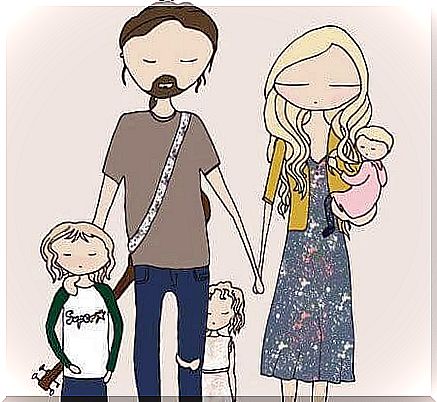How The Emotional Climate At Home Can Be Improved

Maintaining a comfortable emotional climate at home is not easy. In fact, it is especially difficult when strong personalities live under the same roof and the circumstances bring additional pressure. But improving the emotional climate at home is always worthwhile.
Psychologists regularly see families in their practice and help them cope with their problems. While all families love each other, the more time the family spends together, the more likely problems and tension will arise. The emotional climate of a home is a shared responsibility. Therefore, every family member can contribute to the harmonious atmosphere at home, but also create conflicts.
However, the people who put the greatest effort into this and bear the most responsibility are usually the parents. You are ultimately responsible for what happens at home. But as children get older and older, they should also take on more responsibility. The emotional climate of a home is something that all family members contribute to depending on their age and ability.
According to a study published in the journal Psychology Science of Therapy , it is important to participate in activities that promote family cohesion. This is still necessary to promote healthy emotional and cognitive development in children. A good relationship with siblings and parents strengthens the emotional bonds and self-esteem of each family member.

Families are no longer what they used to be
A parent’s responsibility goes beyond meeting basic needs like providing daily groceries. We shouldn’t underestimate the influence and power that parents have. Raising children also includes such important aspects as their upbringing. This works best in an environment characterized by respect, support, and affection. This will facilitate the development of enriching relationships as well as establishing norms, discipline, and positive habits. It will have a positive impact on the child’s lifestyle choices and instill values as children learn to make important decisions.
In addition to these challenges, there is another one: Today’s family structures are very different from the traditional family, whose core consists of two spouses. Other family compositions are no longer only possible, but are on the agenda. For example, there are many more single-parent families or families with step-parents or step-siblings.
In addition, the role of parents has changed a lot over the past few decades. Most mothers no longer spend the entire day on housekeeping. You often need to balance this responsibility with a job outside of the home. Therefore, today fathers need to take a more active role in raising and caring for their children. This goes beyond the provision of economic resources.
All of these changes and other factors have created new family models that bring opportunities and challenges. This has a direct impact on the emotional climate at home.
How can the emotional climate at home be improved?
The answer to this question is not easy, primarily because it is an open-ended question. In order to improve the emotional climate in our home, we should first analyze our family’s problems. Only when we have filtered out the conflicts that are relevant to our family and have identified the personalities of the individual family members can we establish guidelines to improve the emotional climate at home.
Still, there are some general guidelines that apply to most cases.

Promote positive behavior
This is an important aspect of improving the emotional climate at home. Families who live in positive environments treat one another with respect. Respect involves a range of behaviors. An example could be that no aggressive or hurtful language is tolerated. We need to get rid of insults and abusive words from the family, and we shouldn’t intensify such behavior in children.
Family members should say goodbye when they leave the house and say hello when they return. We should also show affection for one another if we are to improve the emotional climate in our home.
Each family member has a specific role
This means that parents should act like parents and children like children. While this may seem obvious, there are many parents who forget their role. Parents are role models whose fundamental task is to raise their children. Your primary goal should be to contribute to the well-being and growth of your children.
To achieve this, some parents choose an authoritarian style. However, children with authoritarian parents tend to feel restricted. On the other hand, parents who are unable to set clear boundaries tend to raise disoriented and impulsive children. With that in mind, it is best to be democratic, limit yourself and be persistent, but always be ready to listen.
Children, on the other hand, have to learn to respect their parents. You should take on more responsibility and give yourself permission to make mistakes during puberty. A child who does not follow the instructions of his parents is not “guided”. This child grows up feeling insecure because they have no reference points. On the other hand, a dependent child does not voluntarily take risks that are necessary for growth.
Participate in family activities
Families should have fun. It is important that family members plan and carry out worthwhile activities together. Children should have friends, just like parents, but they should also have nice things to do with their family. Common leisure activities could include traveling to other cities, eating out, watching movies together, playing sports, etc. It is important that family leisure time is of quality and that all members enjoy the time.

There are many other ways that can help us improve the emotional climate at home. But to list them all here is going too far and beyond the scope of this article. If the emotional climate at home is unbearable, families should not hesitate to seek advice from a psychologist. Experts can help families through this difficult time together.









